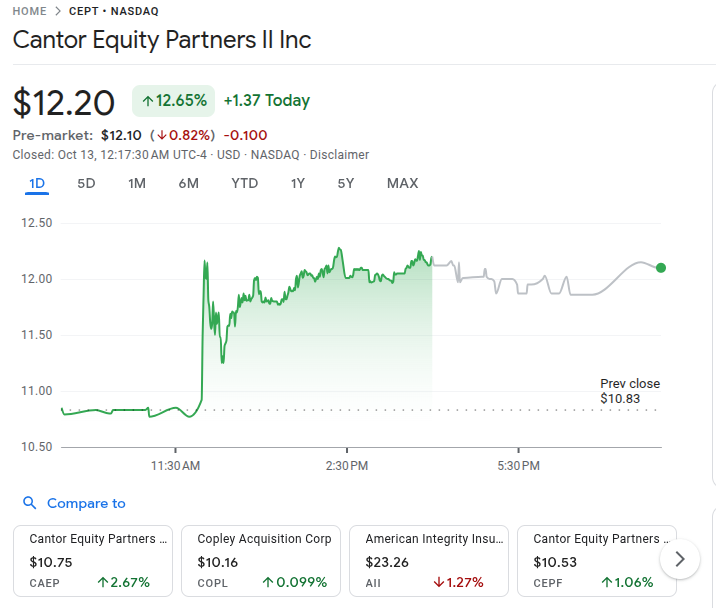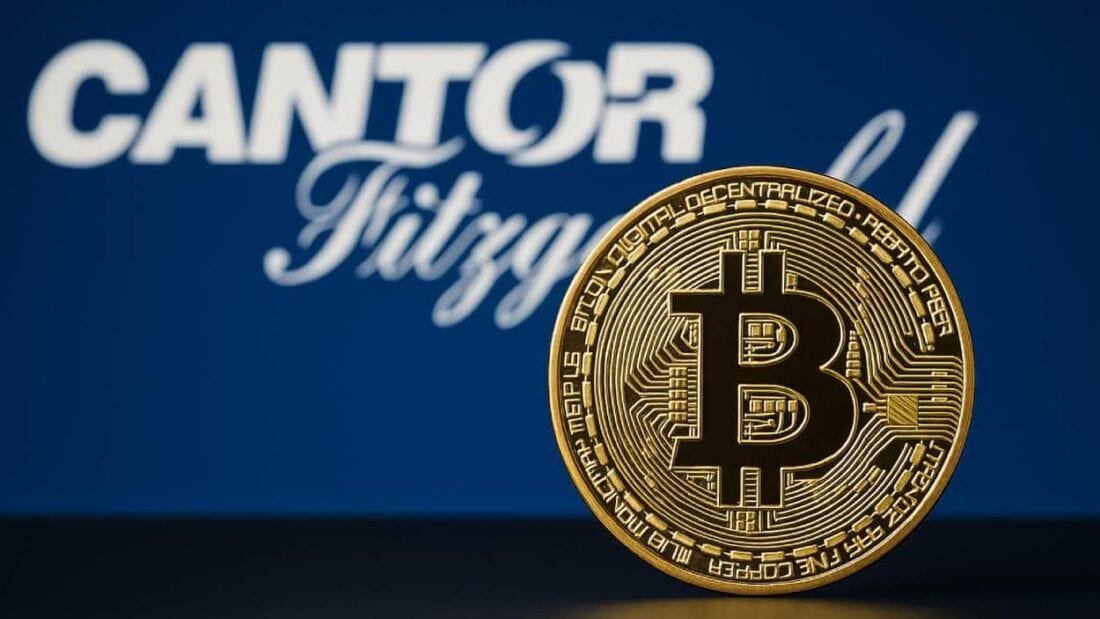Securitize, a leading blockchain firm in the tokenized asset space, is reportedly in talks for a potential $1 billion merger with a special purpose acquisition company (SPAC) backed by Cantor Fitzgerald.
Key Takeaways
- Securitize is exploring a SPAC merger with Cantor Equity Partners II that could value the firm at over $1 billion.
- The firm manages $4.62 billion in tokenized real-world assets, making it a market leader in the RWA sector.
- Backed by major investors including BlackRock, Morgan Stanley, ARK, and Coinbase Ventures.
- Cantor Equity Partners II shares surged 12.5% following news of the potential deal.
What Happened?
Securitize is considering going public through a merger with Cantor Equity Partners II Inc., a blank-check company sponsored by financial services firm Cantor Fitzgerald. If finalized, the deal would value Securitize at more than $1 billion, according to people familiar with the discussions cited by Bloomberg. However, the company has not committed to the deal and may choose to remain private.
why is no one talking about @Securitize probably going public via a SPAC pic.twitter.com/bFkBQ6nqdh
— shirollsasaki.base.eth (@shirollsasaki) October 12, 2025
Securitize’s Role in the Tokenization Market
Securitize is a major force in the tokenization of real-world assets (RWAs). The firm manages approximately $4.62 billion in tokenized assets, according to RWA.xyz. Its platform enables the digitization of traditional financial instruments such as U.S. Treasuries, stocks, real estate, and index funds into blockchain-based tokens.
One of its flagship contributions is the support of BlackRock’s USD Institutional Digital Liquidity Fund (BUIDL), the largest tokenized U.S. Treasury fund on the blockchain. As of recent figures, BUIDL holds more than $2.8 billion in assets, dwarfing competitors like the Franklin OnChain US Government Money Fund (BENJI), which holds about $861 million.
Securitize is also registered with the U.S. Securities and Exchange Commission as a transfer agent and holds regulatory licenses across parts of Europe and Japan. Recently, it introduced offramp functionality for BUIDL and VanEck’s VBILL tokenized funds using Ripple’s RLUSD stablecoin, aimed at improving settlement efficiency.
Details of the Potential SPAC Deal
The potential merger would take place through Cantor Equity Partners II Inc., a SPAC that raised $240 million in its May IPO on Nasdaq. The blank-check company is chaired by Brandon Lutnick, the son of Cantor Fitzgerald CEO Howard Lutnick, who also serves as the U.S. Secretary of Commerce.
Both companies have declined to comment publicly on the ongoing discussions. Still, sources close to the matter suggest that deliberations are active and that a deal could be finalized, although there is no guarantee.
If successful, this merger would make Securitize one of the few blockchain-native firms to go public, reinforcing Wall Street’s growing interest in blockchain applications for traditional finance.
Strong Institutional and VC Backing
Securitize’s credibility is bolstered by backing from top-tier investors, including:
- BlackRock
- Morgan Stanley Tactical Value
- ARK Venture Fund
- Coinbase Ventures
- Blockchain Capital
- Nomura Holdings
- Jump Crypto, which took a strategic stake in May 2025
These supporters reflect confidence in Securitize’s long-term potential to reshape financial infrastructure through tokenization.
Market Reaction and Industry Significance
The Bloomberg report sparked a 12.5% surge in Cantor Equity Partners II’s share price, reflecting market enthusiasm for the merger and the broader tokenization trend. Analysts view the deal as a potential turning point for blockchain’s integration with traditional finance.

A recent report by Animoca Brands projected that the tokenization of real-world assets could unlock a $400 trillion market, spanning everything from private credit and bonds to stocks and commodities.
CoinLaw’s Takeaway
I see this as a landmark moment for blockchain adoption in traditional finance. Securitize is not just another crypto firm trying to survive a volatile market. It’s a serious infrastructure player with regulatory footing, institutional partnerships, and a product that actually works in today’s financial system. In my experience, the firms that bridge gaps like this are the ones that last. If the deal closes, this could set a powerful precedent for how serious Wall Street is about tokenized finance.


































































